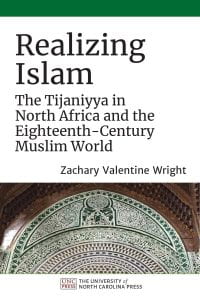
Realizing Islam: The Tijaniyya in North Africa and the Eighteenth-Century Muslim World by Zachary Wright
A new book by Zachary Wright—Institute for the Study of Islamic Thought in Africa (ISITA) faculty affiliate, Northwestern alumnus, and associate professor at Northwestern University in Qatar—explores 18th-century Islamic scholarship in North Africa, with a particular focus on the founding of the Tijaniyya Sufi order. Realizing Islam: The Tijaniyya in North Africa and the 18th-Century Muslim World (University of North Carolina Press, 2020) is available in print and, thanks to support from the Mellon Foundation, online at library.oapen.org/handle/20.500.12657 /40109. (Hear Wright interviewed about his book at stitcher.com/podcast/new-books-network/new-books-in-islamic-studies/e/77130468.)
Realizing Islam situates the Tijaniyya—the largest Sufi order in North and West Africa—within the broader intellectual history of Islam in the early modern period. Introducing the group’s founder, Ahmad al-Tijani (1737–1815), Wright focuses on the wider network in which al-Tijani traveled, revealing it as a veritable global Islamic revival whose scholars commanded large followings, shared key ideas, and produced literature read widely throughout the Muslim world. They were linked through chains of knowledge transmission from which emerged vibrant discourses of renewal in the face of perceived social and political corruption.
Coinciding with the book’s debut, Wright has launched an online initiative to collect and publicize literature related to the Tijaniyya. The Tijani Literature Online (tijani.org) initiative has five goals: providing accessible, objective information about the Tijaniyya and its leading scholars; creating an online database of Arabic primary sources in both published and digitized manuscript formats; creating a council of academics and Islamic scholars who conduct research on the subject; sharing published research and translations; and collecting and sharing multimedia representations of Tijani practitioners, including podcasts, songs, and spoken-word poetry.
The long-term objective of Tijani Literature Online is to complete a published reference work of Tijani authors and their writings, a project first initiated in 2005 by Bayreuth University-based scholar Ruediger Seesemann, then continued at Northwestern through a Ford Foundation grant coordinated by ISITA. This earlier work relied on a team of research scholars tasked with substantive field research throughout North and West Africa. New digital spaces, however, have opened new possibilities for resource exchange, expanding understandings of the texts themselves. Platforms like YouTube return researchers to notions of texts as performances of the type that arguably prefigured textual production in the Arabic-speaking world centuries ago. Tijani Literature Online envisions a new type of collaborative research where disciplinary boundaries of history, religious studies, anthropology, linguistics, and media studies are crossed and where archival work, philological studies, and ethnographies are conducted in dialogue with both other researchers and the communities represented in this research.
The council of scholars already has some 30 members, including academics from universities such as Harvard, Columbia, Sorbonne, and Exeter and Muslim intellectuals from diverse locations such as Egypt, South Africa, and Mexico. The initiative has been funded in part by a grant from Northwestern University in Qatar’s research office and by additional support from the Office of the Provost.
This article originally ran in the PAS Newsletter, Fall 2020, Volume 31, Number 1
